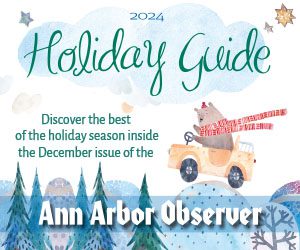Residents of Loch Alpine, the golf course subdivision off W. Huron River Dr., are spending their third summer with a shuttered clubhouse, empty swimming pool, and knee-high grass on the greens and fairways. After a legal loss in February, the Loch Alpine Improvement Association is preparing an appeal and surveying residents about what to do next. If they fail, the Ann Arbor Country Club may never reopen–and could instead disappear under as many as 100 new homes.
The club went into debt in the early 2000s to finance facility upgrades. When the expected membership boom never materialized, it couldn’t repay the mortgage. In 2010, West Virginia oncologist and developer Lew Whaley took control by buying the debt–and, after his own improvements failed to pay off, he shut the club at the end of 2015.
In the fall of 2016, Whaley presented LAIA with two plans to build housing on the golf course. The first had eighty homes but would have kept the clubhouse, pool, and tennis courts. When the homeowners association rejected that, he came back with a plan to demolish all the sports facilities and increase the number of houses to 117. (“Trouble at Loch Alpine,” December 2016.)
When that plan, too, was rejected, Whaley sued.
The homeowners’ association was counting on a clause in the original 1929 deed that read, “No use shall be made of the golf lots other than the operation of a private or semi-private golf course.” A 1975 restriction agreement also specified that the course could only be used for recreational purposes.
But Whaley’s attorneys zeroed in on another clause in the deed restriction that said “a golf course shall be the only use alternative to residential use” of the golf lots. And to residents’ dismay, judge Archie Brown ruled that neither the 1929 deed nor the 1975 agreement prohibited residential use.
LAIA president Peter Logan says he can’t comment on the litigation, but the association has filed paperwork to appeal to the Michigan Court of Appeals.
“We’re really sick at heart about the country club situation,” says Debbie Penrose, whose yard backs onto the golf course. “We’re concerned about the growing population of coyotes and deer here. The field here is full of ticks–so I won’t let the kids or our dog out there.”
Others, like former board member Marvin Boluyt, say they like the open space and wilder landscape–“though I’d love to see all the facilities open again.”
At best, the next hearing in the lawsuit will be next spring. LAIA isn’t revealing the results of its member survey, but several residents who spoke to the Observer suggest that the homeowners themselves could buy the property, then operate the clubhouse, pool, courts, and a nine-hole golf course.
The purchase, they say, could be funded by an assessment on homeowners–and by selling off the rest of the course to a developer.



You didn’t interview me or my neighbors about the article. I don’t know anyone who wants to be part of buying the defunct Country Club or being assessed for the fiasco!
Eventually the elite board will realize houses will be built. They must accept the inevitable and work with a developer so our roads and tranquil neighborhood are protected otherwise we will have hundreds of condos in our backyard, noise, traffic and ruined roads!!